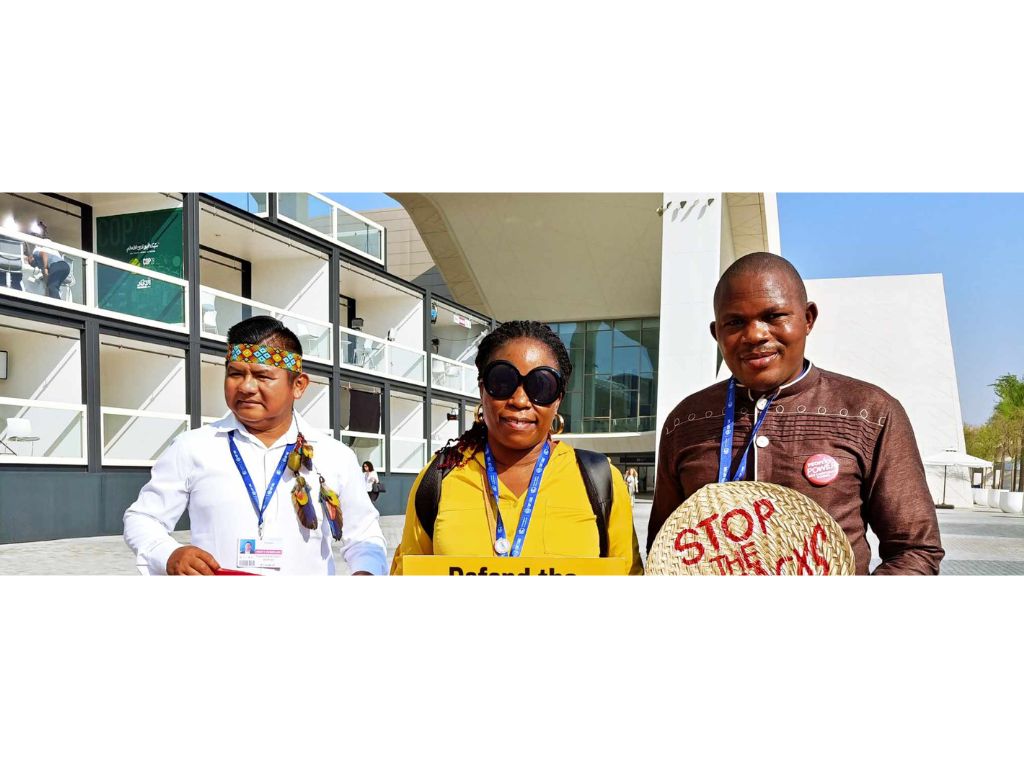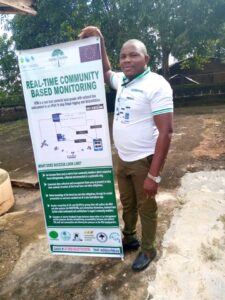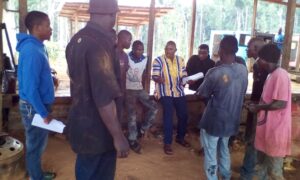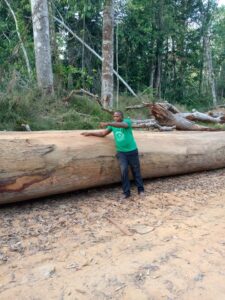
Andrew Y.Y. Zelemen is the National Facilitator of the National Union of Community Forestry Development Committees in Liberia. Andrew shares his learning journey and what inspires him, along with the important work National Union of Community Forestry Development Committees in Liberia does in the field of land and environmental justice.

Andrew Y. Y. Zelemen conducting a forest monitoring project for communities.
I live in one of the rural communities in Liberia. And then, when I saw that the logging companies working in our communities were not providing benefits, I started reading the forest reform law. We have 10 core regulations, and one of them, reg. 105-07, which specifically speak of what rights these communities have on forestry resource exploration.
So, when I realized that benefits were not given to the communities, I began to join the community representatives and informed them that there are things in the law that these companies are required to do, but I don’t see them doing. To ensure that these benefits are received, I took personal initiative. There was a man who was appointed as head of the scholarship Committee for the communities, who was to ensure that the logging company provide scholarships for community members. During that time, I was a student at the university.
Almost six months later, the man will not call a community meeting nor say anything about this scholarship. I wrote the head of the community representatives group head a letter, and together with my fellow youth, we declared a vote of no confidence in that particular representative. We’ve already spoken to the chairperson of the committee that we had a letter as a community youth and with the support we’ve given to the committee, they allowed me to read the letter in the bigger community meeting. And so, I stood up and read the letter of voter no confidence in this man. And on that day, I was appointed as the new chair of the scholarship committee, and just within the first three months, we were able to demand from the company scholarship and they provided 5, 000 US dollars to our community, where we recruited over 70 grade school university students to benefit.
That was a personal initiative at the community level. And then when the new agreement was being formulated, we advocated for increment and agreed amount for scholarship to be paid per semester, and up to the time the company left the community. The scholarship benefit amount was 13, 000 US dollars annually.
I became the chairperson of the committee. And even when I graduated from university, I was still chairing the committee, ensuring that students from the affected communities continue benefiting from the company operations. In time, the committee was able to establish a community clinic, and in fact, that clinic still provides healthcare services to the community members. And the clinic is still being run by the community. I was part of the team that went to the Ministry of Health to ensure that some of the workers at our clinic were placed on government payroll, and to date, the three professional healthcare workers at the clinic are placed on government payroll.
The National Union is one of the recognized forest stakeholder organizations in Liberia. We co-chair the national multi-stakeholders monitoring committee that meets monthly to discuss issues affecting communities in the forestry sector. We have worked with other legal groups.

Conducting research with workers.
I would say there have been a series of moments that have really encouraged me. One notable instance was when the former president of the national union gave me an award of encouragement. His tenure had expired, and he was leaving. I decided to leave as well, but he called for an honor for me for the work that I have done. And at that point, I decided to leave to do other things. It feels great to know that your work is being seen. The new president and the leadership of the union thought that we needed to do more with this union to be able to push things or help the new leadership to push the interest of communities. I actually felt appreciated, and so I decided to continue this journey. That was a turning point. I started to look at the communities, not just from forestry, but looking at the communities from the different livelihood activities where communities are involved in not just forestry, but in agricultural activities. That’s why I developed another proposal to the leadership of the union for us to look beyond forestry, and look at other issues that are affecting communities, especially in the area of land ownership.
In 2022, the decision was made that the union should go beyond forestry and work with communities in customary land ownership, or formalization of customary land ownership. That’s why in 2022, we started advocating for customary land rights for communities, especially the formalization processes. In 2023, we were able to get funding to support communities in this process. We also got funds from the Legal Empowerment Fund that actually brought us to the Grassroots Justice Network, and that was a turning point as well. That brought us to advocating for communities on their land rights and benefit from natural resources. So since then, we’ve been working hard on customary land rights as well as community livelihood improvement. Until now, we’ve been working on a range of issues, from benefits from forestry, climate-smart agricultural initiatives, and community rights on land acquisition, to land use management planning.
I would say returning to the community and being elected as a leader was a turning point. I was a bit disconnected, because I was out in the township of Lethem and life was tough and different there. You learn about the struggles, then you go into communities, and you’re hearing their concerns. I think that was the point where I decided that I’m going to do this work, and that this is something that I should be involved in.
One thing we have learned from the network is that with all of the work we were doing, we did not understand that we were called paralegals. Until one of our union representatives in Nigeria – when they were told the work of paralegals – it shows exactly what the union has been involved with. So that alone brought to our attention that the work we are doing, we are providing legal-like services to the communities.

Inspecting logging activities
It was through the Legal Empowerment Fund (LEF) that I was able to go to COP for the first time. We started establishing networks as a result of our COP trip in Dubai; we were exposed to different networks and were able to learn and share with others. And since this support came from the LEF I can say that during the short time that we’ve been with GJN, you can see the improvement in our work.
And of course, we took LE 101. We did that course and that course brought me to understand that the work we do, we are like facilitators. The power is not with us. The power is with the communities that we work with. And that is true because it has to be the communities who will be in dialogue with the government.
So, in the legal empowerment course, I understood that clearly, that the power is with the people, not with us who help or assist the communities, and I can say that we did that course and our approach to issues have changed as a union: always wanting the communities to be the central decision-makers and the action-takers because when we are doing that, we’re also helping them understand the law, and then they can use the law to advocate for their rights.
Another course that we did is the Ecosystem for Financing. That course has opened our minds on fundraising. You will see that while we’ve worked for many years, we’ve never had a website. And part of the things we do, many people across the world don’t even know what we are doing. So how can we even ask them for funding? So today, we decided to establish our website. We’re still working on it and we’ll be officially launching it. We hope we will be able to organize a lot of fundraising initiatives and be able to do multiple applications to donors, and as a result, we can have funding coming from different sources, because it’s part of how we learned from the course on financing. We also learned that we have to organize our activities and keep in mind the donors’ interests and the partners’ interests. So in summary, those courses improved our approach in fundraising and advocacy, and in particular, in showing that the communities are the center.